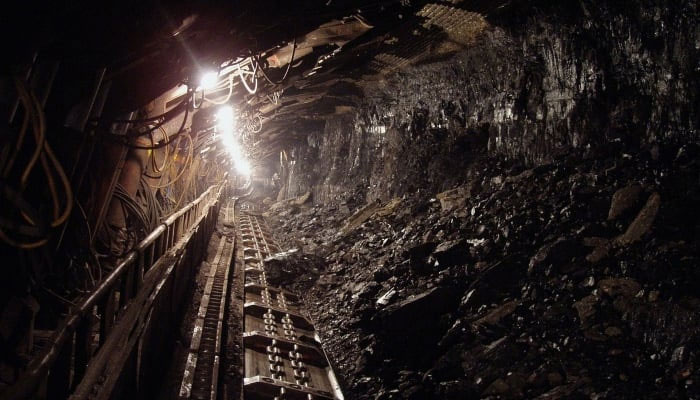Miners’ dirge
Collapsed Sanjidi coal mine is yet another grim reminder of recurring nightmare for miners across Balochistan
A collapsed mine; one miner’s body discovered; eleven others still trapped beneath 4,000 feet of debris, gas, and shattered rock – victims of not just an accident but a system that has long sacrificed human lives at the altar of profit and neglect. This is the reality of the deadly conditions that workers in Pakistan’s mining sector endure daily. The collapsed Sanjidi coal mine is yet another grim reminder of the recurring nightmare for miners across Balochistan, where safety standards are routinely flouted, oversight is minimal, and rescue efforts are hampered by a lack of preparation and resources. The mine collapse, caused by a buildup of methane gas, is hardly an isolated incident. The state of Pakistan’s mining industry reflects a profound disregard for the value of human life. Most mines lack basic safety measures such as ventilation systems, allowing dangerous gases like methane to accumulate unchecked. Even after disasters strike, rescue efforts are often agonizingly slow, hampered by poor road infrastructure, outdated equipment, and the absence of nearby medical facilities. For the miners and their families, the wait for help feels endless; for many, it arrives too late.
The loss of life of most miners in such ‘accidents’ is the direct result of a system that places profits over people. Mine owners extract as much as they can – coal, minerals, and the very lives of workers – while investing little to nothing in their safety. Regulatory authorities, too, bear responsibility – often turning a blind eye to these glaring violations. And while the government has promised investigations and action, these assurances have become tragically predictable, offered after every disaster and forgotten until the next. But the workers, not the state or mine owners, pay the heaviest price. They toil in these dangerous conditions because they have no other choice. Unions that once fought for their rights have been systematically weakened, leaving miners with no collective power to demand safety, fair wages, or even basic dignity. This is not just negligence; it is systemic oppression. If Pakistan is serious about protecting its workers, the time for hollow promises has passed. The government must implement stringent safety regulations and enforce them with zero tolerance for violations. Modern technology for ventilation and gas monitoring must become a mandatory standard. Rescue teams must be properly trained and equipped to respond immediately, and medical facilities must be established near mining areas. Most importantly, miners must be empowered. Strong, independent unions are the backbone of worker protection, and they must be allowed to flourish free from interference.
The Sanjidi collapse is not a tragedy but an outrage – or at least it should be in any society that values human life. One life has already been lost, and eleven others hang in the balance. Their families wait, while the state struggles to respond to a disaster that could have been prevented. These workers are not just victims of an accident but of a system that sees them as expendable. Pakistan’s miners deserve better. They deserve safety, respect, and a government that values their lives over profits. By not protecting our workers, we remain complicit in burying them. Instead of digging graves for our miners, can we start building a system that truly safeguards their lives and rights?
-
 ChatGPT Caricature Prompts Are Going Viral. Here’s List You Must Try
ChatGPT Caricature Prompts Are Going Viral. Here’s List You Must Try -
 James Pearce Jr. Arrested In Florida After Alleged Domestic Dispute, Falcons Respond
James Pearce Jr. Arrested In Florida After Alleged Domestic Dispute, Falcons Respond -
 Cavaliers Vs Kings: James Harden Shines Late In Cleveland Debut Win
Cavaliers Vs Kings: James Harden Shines Late In Cleveland Debut Win -
 2026 Winter Olympics Snowboarding: Su Yiming Wins Bronze And Completes Medal Set
2026 Winter Olympics Snowboarding: Su Yiming Wins Bronze And Completes Medal Set -
 Trump Hosts Honduran President Nasry Asfura At Mar-a-Lago To Discuss Trade, Security
Trump Hosts Honduran President Nasry Asfura At Mar-a-Lago To Discuss Trade, Security -
 Cuba-Canada Travel Advisory Raises Concerns As Visitor Numbers Decline
Cuba-Canada Travel Advisory Raises Concerns As Visitor Numbers Decline -
 Anthropic Buys 'Super Bowl' Ads To Slam OpenAI’s ChatGPT Ad Strategy
Anthropic Buys 'Super Bowl' Ads To Slam OpenAI’s ChatGPT Ad Strategy -
 Prevent Cancer With These Simple Lifestyle Changes
Prevent Cancer With These Simple Lifestyle Changes -
 Air Canada Flight Diverted St John's With 368 Passengers After Onboard Incident
Air Canada Flight Diverted St John's With 368 Passengers After Onboard Incident -
 Experts Reveal Keto Diet As Key To Treating Depression
Experts Reveal Keto Diet As Key To Treating Depression -
 Inter Miami Vs Barcelona SC Recap As Messi Shines With Goal And Assist
Inter Miami Vs Barcelona SC Recap As Messi Shines With Goal And Assist -
 David Beckham Pays Tribute To Estranged Son Brooklyn Amid Ongoing Family Rift
David Beckham Pays Tribute To Estranged Son Brooklyn Amid Ongoing Family Rift -
 Jailton Almeida Speaks Out After UFC Controversy And Short Notice Fight Booking
Jailton Almeida Speaks Out After UFC Controversy And Short Notice Fight Booking -
 Extreme Cold Warning Issued As Blizzard Hits Southern Ontario Including Toronto
Extreme Cold Warning Issued As Blizzard Hits Southern Ontario Including Toronto -
 Lana Del Rey Announces New Single Co-written With Husband Jeremy Dufrene
Lana Del Rey Announces New Single Co-written With Husband Jeremy Dufrene -
 Ukraine-Russia Talks Heat Up As Zelenskyy Warns Of US Pressure Before Elections
Ukraine-Russia Talks Heat Up As Zelenskyy Warns Of US Pressure Before Elections




